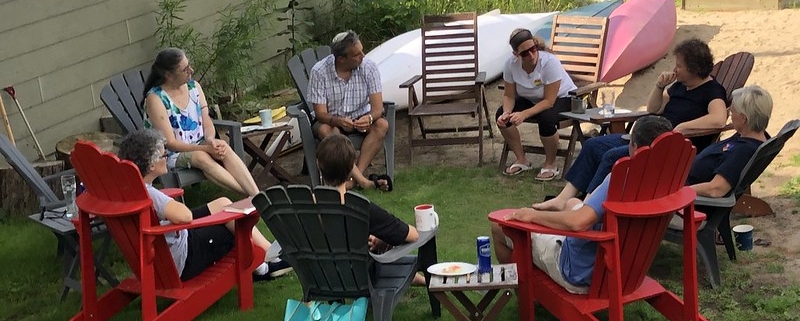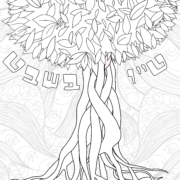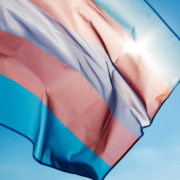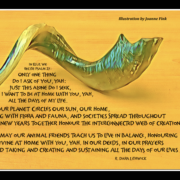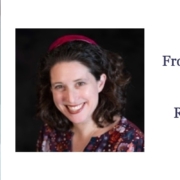Parsha Shoftim, Capital Pride, and Building our Bayit
This week’s parsha, Shoftim, describes four main forms of communal leadership and presents many different leadership dilemmas. The four types of leadership are: judges, responsible for resolving disputes fairly; monarchs (government), responsible for building society; priests (rabbis), responsible for our tradition and for caring for the spiritual needs of the people; and prophets, responsible for speaking truth to power (activism). Each kind of leader is rooted ultimately in the same Torah ideals of religious freedom, justice, and peace.
Leadership, by definition, is a messy business.
And we need it, for society is what we make it – the responsibility for a just society falls squarely on our shoulders, Aleinu. And if we accept that Jewish tradition asks us to partner with God to build a just society, then it necessarily follows that the organizations we create should model the type of society that we want to have in how they treat their members. This week’s parsha also contains the maxim “tzedek, tzedek tirdof” (16:20). Rabbi Arthur Waskow teaches that tzedek, “justice” is mentioned twice in order that we both pursue justice using means that are just (justice x1), and that we also pursue justice for ourselves and for the other (justice x2). And the word tirdof – to pursue, to chase after – emphasizes the urgency of the commandment. In other words, our organizations need to “walk the talk” of kedushah/ holiness, of kavod/ respect, and of justness and justice. Now, and always.
Imagine if our religious and political organizations actually chased after tzedek through all of their actions and interactions? What would that look like and feel like to endeavour to bring out the best in ourselves and each other? To take on the commandment of ve’ahavta l’reacha kamocha (hareini mekabel alai et mitzvat haboreh – ve’ahavta l’reacha kamocha), or as Hillel teaches in Tractate Shabbat 31a “that which is hateful unto you do not do to your neighbour. This is the whole of the Torah, The rest is commentary. Go forth and study”? If that were our default collective behaviour, then even when normal disagreements or frustrations or petty annoyances arise (disagreement is okay!) the response or coping mechanism would come from a place of mutual respect rather than distrust and division.
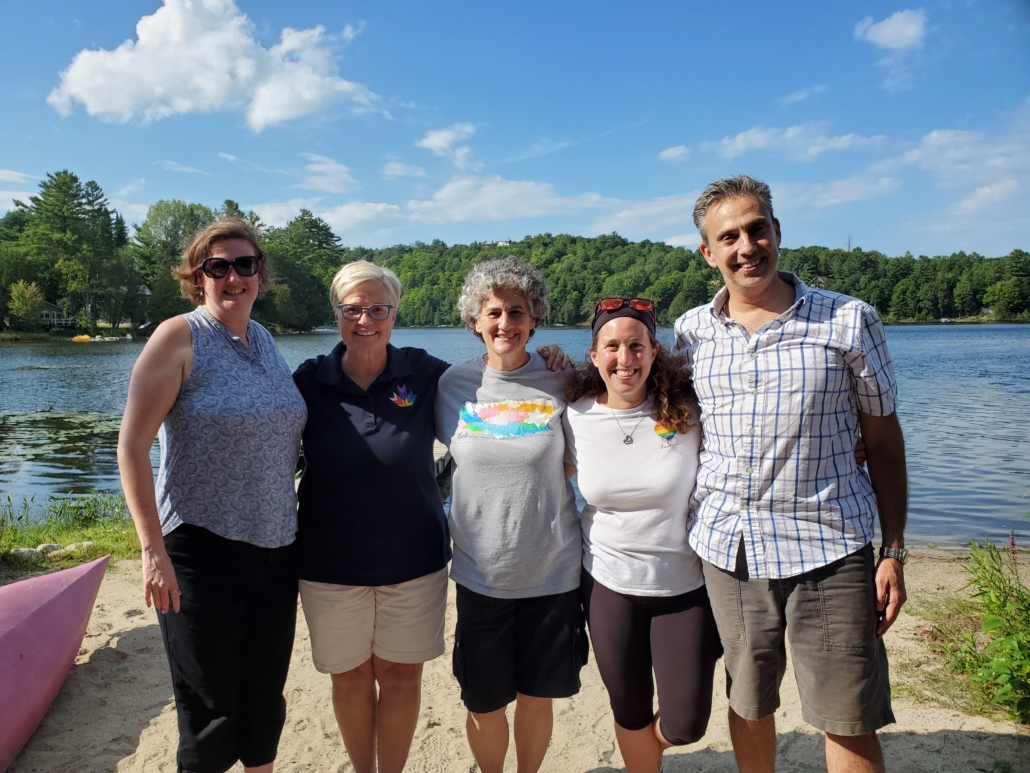
Last week, while at a Bayit Board retreat that coincided with Capital Pride Week in Ottawa, we were privileged to experience modalities of leadership connecting to build a better world. The Bayit board convened a group of area Jewish leaders and leaders in local queer community for a conversation about allyship, and about how to support each other across our differences. Our roundtable conversation included Bayit’s board of directors as well as representatives from area synagogues, from different denominations of Judaism, Jewish Federation of Ottawa, and more. Set by a lake just outside the city, the roundtable brought together the best of Jewish teachings and Pride. And our conversation demonstrated just how important all the modes of leadership set out in Parsha Shoftim have been to increasing LGBTQ2+ inclusion and celebration in Canada, the U.S., and in our Jewish communities.
The roundtable focused on the following questions:
- As we come from different communities with different needs and interests, how can we “cross-train” so that we can build each other up and support each other?
- How do we “ally up” for each other?
- What’s the spiritual work of allyship and how do we do it wisely and well?
- What does it mean to show up for each other in a meaningful way?
- How do we manage the areas where we disagree?
Our featured speaker for the roundtable was local legend and amazing LGBTQ2+ leader and ally to our communities, and the current Executive Director of the LGBT Purge Fund, Michelle Douglas. Michelle served as an officer in the Canadian Armed Forces from 1986 to 1989. She was honourably discharged from the military in 1989 under the military’s “LGBT purge”. She launched a landmark legal challenge against the military’s discriminatory policies against LGBT service members that resulted in the ending of Canada’s discriminatory policies in 1992. Her experience in the military was the start of 30 years of social justice and human rights activism.
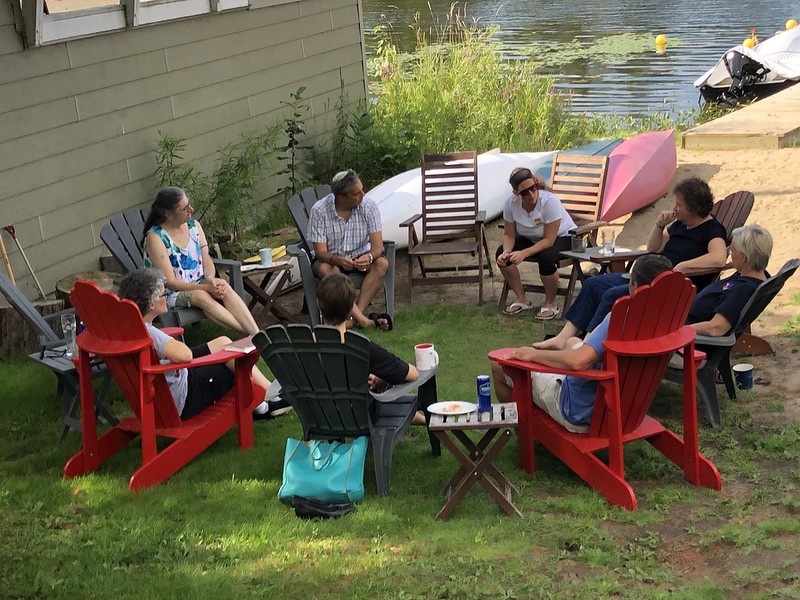
One thing that stood out about Michelle’s story and the discussion that followed is how all the modes of leadership set out in Parsha Shoftim played important roles in the struggles for LGBTQ2S+ equality and inclusion. Advocates and activists have challenged discriminatory laws and policies; judges have applied principles of equality and human rights in overturning such laws and policies; government and policy heads have themselves embraced more inclusion; and religious and community leaders have provided pastoral support and have created prayers and rituals that reflect the beautiful diversity of our communities (i.e. for equal marriage, for coming out, for transitioning, gender inclusive aliyot and b’nei mitzvahs, etc.). At the same time, though, we have sadly also seen how the four modes of leadership can also discriminate, divide, and denigrate. It is indeed aleinu, upon us, to choose what kind of leadership we want. How do we do that?
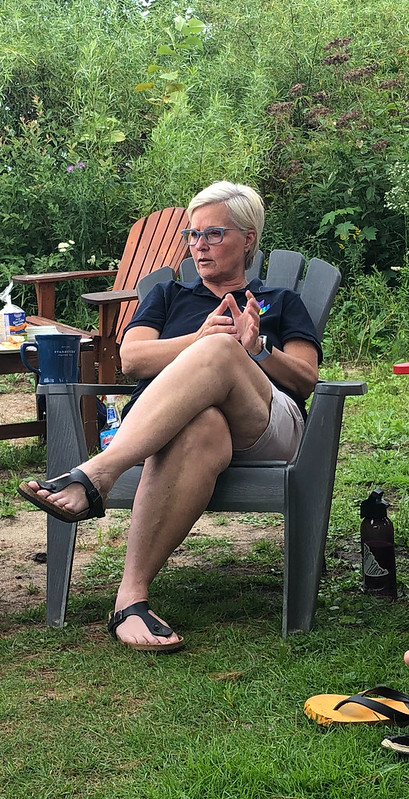 This takes us back to another key teaching in this week’s parsha. Michelle told us that the Torah teaching Tzedek, tzedek tirdof, “Justice, justice shall you pursue” (Deut. 16:20) has been her North star. Michelle embodies her North star maxim. Though she had been dismissed by the Canadian military as part of its purge of members of the public service suspected of being LGBTQ2+, she did not give up on the possibility that institutions like the military could change. Her ongoing faith in people, in government, in each other, her commitment to righting wrongs has made our country a better place not just for LGBT2S+ folx, but for all of us.
This takes us back to another key teaching in this week’s parsha. Michelle told us that the Torah teaching Tzedek, tzedek tirdof, “Justice, justice shall you pursue” (Deut. 16:20) has been her North star. Michelle embodies her North star maxim. Though she had been dismissed by the Canadian military as part of its purge of members of the public service suspected of being LGBTQ2+, she did not give up on the possibility that institutions like the military could change. Her ongoing faith in people, in government, in each other, her commitment to righting wrongs has made our country a better place not just for LGBT2S+ folx, but for all of us.
One roundtable participant noted that in Torah we have the verses tzedek tzedek tirdof (Deut. 16:20) and the injunctions to love your neighbor as yourself and to love the stranger (repeated many times in Torah). What does it take to regard a neighbor not as “other,” even if we disagree on matters, even if we disagree on fundamental matters? Can we see each other as made b’tzelem Elohim, in the divine image, even when we differ? It shifts one’s whole way of relating to someone. How do I find our points of connection?
The question arose: how do we comfort Jews who now feel excluded by some members of the Progressive community, and work to end that marginalization? How do we do that while also pointing out that as Jews we know what it’s like to feel marginalized and excluded and so we have an obligation not to marginalize others?
Allyship emerged as the answer, the connective tissue for a healthy society. “How do we ally up with each other on the journey toward truth, reparations, reconciliation?” asked another participant. “Because yeah, I am my sibling’s keeper.” Exactly. Michelle added “Allyship isn’t just, it’s okay, if you’re gay you can stay. Allyship is so much more than that. My vested interest, my safety, my identity as whoever I am, depends fundamentally on you being as safe as I am. If Jewish spiritual life has something to offer, this may be it.”
We talked about the phrase sh’ma b’kolah, when God tells Avraham to listen to the voice of Sarai (Genesis 21:12). The words literally mean “listen to her voice,” but they can also mean listen inside her voice. That’s empathy. Listen from inside her voice. One of us noted “That’s what allyship really is. It’s empathy given action. I have skin in the game and I feel it when you suffer.”
Amen.
Bayit Board members also had the opportunity to lead Kabbalat Shabbat services for Pride Shabbat, and joined the Ottawa Jewish community in Ottawa’s Capital Pride Parade on Sunday August 28th. We met communal leaders, political leaders, congregants, LGBTQ2S+ – identified individuals, religious leaders of different faiths, and allies and supporters from across the city. We felt it, we saw it: Tzedek, tzedek tirdof!
Learn more:
Our roundtable discussion went a variety of places from Michelle’s initial remarks. We learned about Rainbow Railroad which helps LGBTQIA2S+ people get to safety. We learned about a documentary called The Fruit Machine, a terrific and trying documentary about the LGBT Purge that took place in the military, the RCMP, and the federal public service.
Special thanks to roundtable participants, the Jewish Federation of Ottawa, and more!

Rabbi Dara Lithwick, the lead builder at Builders Blog, is an advocate for LGBTQ2+ inclusion within diverse Jewish spaces and for Jewish inclusion in LGBTQ2+ spaces. When not at work as a constitutional and parliamentary affairs lawyer, Rabbi Dara is active as an outreach rabbi at Temple Israel Ottawa. She is a member of Bayit’s Board of Directors.

